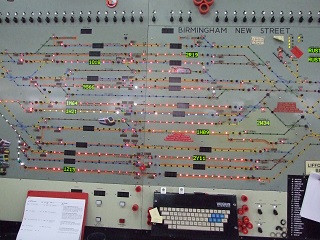
Perhaps one of the best known stations in the country outside of London, Birmingham New Street remains as busy today as it was years ago - if not even busier. The geographic layout of the station and the surrounding tracks mean that trains often have a choice of which line they can take to reach a particular location. For example, trains to Wolverhampton can leave in both the north- and southbound directions, as can cross-country trains to Bristol. Situated in the heart of this is Birmingham New Street station itself - perhaps not the best-looking of stations being buried as it is underneath a 1960s shopping centre, but very important to the national rail system nonetheless.
At your fingertips is the simulation of the entire signal box, the prototype structure being built in the mid-1960s and is now a Grade II listed building. A traditional NX-style panel with integrated TD and controls on the indications board means it is a relatively compact panel with just three operators at quieter times, four when a little busier. But do not let that deceive you, for constant decisions have to be made to keep the trains running in an orderly fashion with the minimum of delays.
Described further in the manual, SimSig Birmingham New Street has three eras, 1976-1991, 1992-2000, and 2001 onwards. This reflects the three most significant formations of track and signalling layout, with electrification and rationalisation in the 1990s, and Proof House Junction completely remodelled in the latter era. Smaller alterations over the years have been consolidated into each of the three eras.